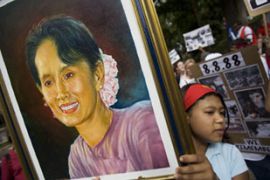Global protests held for Myanmar
Thousands of people gather to demonstrate against violent crackdown on activists.

‘Human rights emergency’
After stopping outside the Downing Street offices of the British prime minister to tie red headbands to the gates, the demonstrators went on to Trafalgar Square to hear MPs, human rights campaigners and Myanmar exiles urge the United Nations to take action against the generals.
|
“Where are the peace and human rights defenders of the world [the super powers]? They haven’t done enough in this case. Isn’t there oil in Myanmar?” Lost Soldier, Arusha, Tanzania Send us your views |
“Burma is not a human rights emergency of today, last week or last month,” Amnesty International’s Irene Khan told the crowd, referring to Myanmar’s name before it was changed by the military government.
“It is a human rights emergency that the world has chosen to forget for the last 20 years. We will not forget this time round, we will not let the people of Burma down.”
In Australia, 250 mainly Myanmar expatriates marched to the Sydney Opera House and hundreds more gathered in Melbourne.
“We are united in opposition to the military dictatorship in Burma. It’s time for the regime to start reconciliation,” Maung Maung Than, organiser of the Sydney protest, said.
But the protests failed to raise similar crowds across Asia. A rally in Bangkok attracted only around 100 people, while another in Tokyo was cancelled.
Violent crackdown
There were no visible demonstrations in Yangon, Myanmar’s largest city, after a violent crackdown on protests which has seen at least 13 people killed and about 2,000 detained.
Nyan Win, a spokesman for the NLD, which initially rejected the government’s offer of conditional talks with Suu Kyi as unrealistic, said on Saturday that it could clear the way for discussions about discussions.
“We can say it is a significant improvement on the past situation. They have never committed themselves to talking to her,” Nyan Win said.
Senior General Than Shwe, the country’s de facto ruler, offered direct talks if Suu Kyi abandoned “confrontation” and her support for sanctions.
In 1990, the NLD won a landslide election victory that the generals have ignored. Suu Kyi has spent 12 of the past 18 years in detention.
Aung Moe Za, head of the Democratic Party for New Society based in neighbouring Thailand, told Al Jazeera that he was positive that there would be change in Myanmar.
“The regime must release Aung San Suu Kyi, the regime must enter into dialogue with Aung San Suu Kyi,” he said.
“Now the regime must realise that they will not be able to contain the pressure anymore, domestically as well as internationally.”
